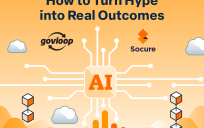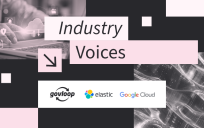As the upside of artificial intelligence (AI) becomes increasingly self-evident, organizations are taking steps to ensure their workforces are AI-ready — at least, they should be. According to the Future of Work report, the share of job postings online that reference ChatGPT or related skills have increased 21-fold since late 2022. Considering the vast majority of occupations (84%) expect at least a quarter of tasks to be automated thanks to AI, the dramatic uptrend makes sense.

From a government workforce perspective, AI has a wide range of potential applications, from supercharging recruiting efforts to enabling upskilling and continuous learning. Research suggests that employees who resist AI are the most likely to end up on the employment chopping block, while the benefits of laying the necessary foundation for the responsible use of AI can snowball as well.
With that in mind, here are three ways AI can help government agencies ensure their workforces are embracing the full potential of this transformative technology.
- AI for Faster Recruiting
One of the shifts being ushered in by AI is a move towards skills-based hiring, as evidenced by a trend away from requiring formal degrees, which broadens the potential employee pool for any given position. Having a skills-based workforce also makes it easier to adjust roles as workflows change.
Skills-based hiring can be accelerated by AI, as machines are well-suited for everything from drafting engaging job descriptions to improving job targeting efforts. When AI is integrated into the hiring process, the humans in the loop are freed up for higher-level tasks (like strategic, long-term personnel planning) while recruitment efforts are tailored and expedited in one fell swoop.
Indeed, 62% of recruiting professionals express optimism about the impact of AI on their work, as companies can acquire employees with the right skills at the right time in a seamless manner. Of course, any job descriptions written by AI should still be reviewed by an employee, which offers an important case study as to why all employees in the business should be schooled in AI basics and best practices.
- Supporting Sustainable Upskilling
To that end, companies should prioritize hiring employees who possess foundational AI literacy. By understanding the technology’s capabilities, applications, and ethical implications, employees will be better-positioned to responsibly extract maximum value in their own workflows. With a strong foundation in place, for instance, employees can be upskilled (in a flexible manner) to actually apply the technology through prompt engineering and the use of AI co-pilots.
Organizations can also leverage courses, certifications, and hands-on projects to help employees continue to hone their AI skills. Scalable, inclusive learning frameworks are the most sustainable. What’s more, AI itself can be integrated into the learning process to help employees navigate content libraries, get feedback throughout the learning process, and gain greater exposure to AI in general.
- Creating Tailored Learning Paths
Business leaders, creative professionals, and developers should also receive tailored learning paths — which AI can help outline — to foster more role-specific skills around the technology, such as AI productivity strategies, prompt engineering, and generative AI integration. But more tailored learning is best realized once AI has already been integrated into recruiting and foundational learning. Taking a multi-pronged approach enhances organizational resilience in a rapidly evolving AI landscape.
Altogether, government agencies must be strategic when it comes to integrating and applying AI. From a workforce perspective, that means embracing skills-based hiring, using AI to streamline recruiting, then fostering an environment of continuous learning — one that can culminate in highly specialized use cases, enabled by handcrafted learning plans. Building an AI-ready workforce isn’t an overnight initiative, but it’s one that is sure to pay off.
Deanna Grady is an accomplished leader in the public sector, serving as Director and Head of Government Sales for North America at LinkedIn Talent Solutions. With over 20 years of sales experience, including 19 years in SaaS leadership, Deanna has dedicated her career to helping federal, state, and local government agencies meet mission-critical objectives. Her expertise in developing strategies for bridging hiring and skills gaps has driven year-over-year growth, enabling government agencies to address workforce challenges and achieve their goals through LinkedIn’s innovative hiring and learning solutions.





Leave a Reply
You must be logged in to post a comment.